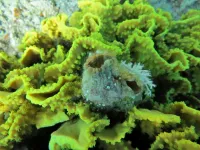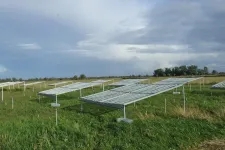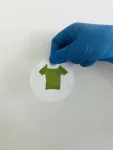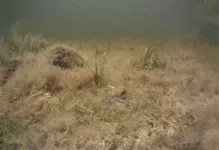An animal able to regenerate all of its organs even when it is dissected into three parts
A surprising discovery in the Gulf of Eilat
2021-05-03
(Press-News.org) An extraordinary discovery in the Gulf of Eilat: Researchers from Tel Aviv University have discovered a species of ascidian, a marine animal commonly found in the Gulf of Eilat, capable of regenerating all of its organs - even if it is dissected into three fragments. The study was led by Prof. Noa Shenkar, Prof. Dorothee Huchon-Pupko, and Tal Gordon of Tel Aviv University's School of Zoology at the George S. Wise Faculty of Life Sciences and the Steinhardt Museum of Natural History. The findings of this surprising discovery were published in the leading journal Frontiers in Cell and Developmental Biology.
"It is an astounding discovery, as this is an animal that belongs to the Phylum Chordata - animals with a dorsal cord - which also includes us humans," explains Prof. Noa Shenkar. "The ability to regenerate organs is common in the animal kingdom, and even among chordates you can find animals that regenerate organs, like the gecko who is able to grow a new tail. But not entire body systems. Here we found a chordate that can regenerate all of its organs even if it is separated into three pieces, with each piece knowing exactly how to regain functioning of all its missing body systems within a short period of time."
There are hundreds of species of ascidians, and they are found in all of the world's oceans and seas. Anyone who has ever opened their eyes underwater has seen ascidians without knowing it, as they often camouflage themselves as lumps on rocks and are therefore difficult to discern. The animal that is the subject of this new study is an ascidian from the species Polycarpa mytiligera, which is very common in the coral reefs of Eilat.
"By all accounts, the ascidian is a simple organism, with two openings in its body: an entry and an exit," says Tal Gordon, whose doctoral dissertation included this new research. "Inside the body there is a central organ that resembles a pasta strainer. The ascidian sucks in water through the body's entry point, the strainer filters the food particles that remain in the body, and the clean water exits through the exit point. Among invertebrates, they are considered to be the closest to humans from an evolutionary point of view."
Ascidians are famous for their regenerative ability, but until now these abilities have been identified mainly in asexual reproduction. Never before has such a high regenerative capacity been detected in a chordate animal that reproduces only by sexual reproduction.
"There are species of ascidians that perform simple regeneration in order to reproduce," Gordon says. "These are species with a colonial lifestyle, with many identical individuals connected to one another. They replicate themselves in order to grow. In contrast, the ascidian from Eilat, Polycarpa mytiligera, is an organism with a solitary lifestyle, without the capacity for asexual reproduction, similar to humans. In previous studies we showed that this species is able to regenerate its digestive system and its points of entrance and exit within a few days. But then we wanted to see if it is capable of renewing all of its body systems. We took a few individual ascidians from Eilat and dissected them into two parts, which were able to replenish the removed sections without any problem. In a subsequent experiment, we dissected several dozen ascidians into three fragments, leaving a part of the body without a nerve center, heart, and part of the digestive system. And contrary to our expectations, not only did each part survive the dissection on its own, all of the organs were regenerated in each of the three sections. Instead of one ascidian, there were now three. This is very astonishing. Never before has such regenerative capacity been discovered among a solitary species that reproduces sexually, anywhere in the world."
Prof. Shenkar concludes: "Since the dawn of humanity, humans have been fascinated by the ability to regenerate damaged or missing organs. Regeneration is a wonderful ability that we have, to a very limited extent, and we would like to understand how it works in order to try and apply it within our own bodies. Anyone snorkeling in the Gulf of Eilat can find this intriguing ascidian, who may be able to help us comprehend processes of tissue renewal that can help the human race."
INFORMATION:
[Attachments] See images for this press release:

ELSE PRESS RELEASES FROM THIS DATE:
2021-05-03
Water is a scarce resource in many of the Earth's ecosystems. This scarcity is likely to increase in the course of climate change. This, in turn, might lead to a considerable decline in plant diversity. Using experimental data from all over the world, scientists from the Helmholtz Centre for Environmental Research (UFZ), the German Centre for Integrative Biodiversity Research (iDiv), and the Martin Luther University of Halle-Wittenberg (MLU) have demonstrated for the first time that plant biodiversity in drylands is particularly sensitive to changes in precipitation. In an article published in Nature Communications, the team warns that this can also have consequences for the people living in the ...
2021-05-03
The terms "co-creation" and "co-production", which denote the possibility for laypeople to participate in decision-making processes that affect their lives, have been gaining popularity. A new IIASA-led study explored options for empowering citizens as a driver for moving from awareness about the need to transform energy systems to action and participation.
The European Union's climate and energy policies for 2020-2030 require decarbonization of the energy sector. To this end, EU member countries are working on a number of key goals including greater energy efficiency, greater use of renewable energy, and increased energy security across the EU. The successful ...
2021-05-03
In recent decades, Spain has undergone rapid social changes in terms of gender equality, despite, as a result of the Franco dictatorship, starting from a more backward position than most European countries. This process is hampered by the economic downturn that began in 2008, underlining the importance of the economic context in the development of gender inequality levels. Little attention has been paid in academia to how this gender revolution is associated with factors related to individual wellbeing.
A study by Jordi Gumà, a researcher at the Department of Political and ...
2021-05-03
The human world is, increasingly, an urban one -- and that means elevators. Hong Kong, the hometown of physicist Zhijie Feng (Boston University),* adds new elevators at the rate of roughly 1500 every year...making vertical transport an alluring topic for quantitative research.
"Just in the main building of my undergraduate university, Hong Kong University of Science and Technology," Feng reflects, "there are 37 elevators, all numbered so we can use them to indicate the location of hundreds of classrooms. There is always a line outside each elevator lobby, and if they are shut down, we have to hike for 30 minutes."
Feng and Santa Fe Institute Professor ...
2021-05-03
Myotonic dystrophy is a hereditary degenerative neuromuscular disease that occurs mainly in adults, affecting about 50,000 people only in Spain. Symptoms range from difficulty walking and myotonia (great difficulty in relaxing the contracted muscles) to severe neurological problems, leading to progressive disability that unfortunately puts many of those affected in a wheelchair. This disease is very heterogeneous among patients (age of onset, progression, hereditary transmission, affected muscles), which makes the development of generic treatments especially complex.
Currently, drugs against myotonic ...
2021-05-03
LAWRENCE -- Like much of society, college athletics were thrown into disarray by the COVID-19 pandemic. While student athletes were suddenly prevented from competing, training or seeing as much of their teammates and coaches, those who perceived they were part of a positive sporting environment also coped better during the early days of the crisis, a new study from the University of Kansas has found.
KU researchers have long studied a caring, task-involved sporting climate, in which young athletes receive support and recognition for their efforts, while mistakes are treated as learning opportunities. But the pandemic provided a unique opportunity to see whether the approach helped collegiate athletes cope with the unique stresses and challenges that came with the disruption ...
2021-05-03
Social media may make it easier for people to engage online, but I does not provide certain benefits of real-life human interactions, says a Michigan State University researcher.
"Problematic social media use has been associated with depression, anxiety and social isolation, and having a good social support system helps insulate people from negative mental health," said Dar Meshi, an assistant professor in the Department of Advertising and Public Relations at MSU. "We wanted to compare the differences between real-life support and support provided over social media to see if the support provided over social media could have beneficial effects."
The research was published online April 29 in the journal Addictive Behaviors.
While ...
2021-05-03
Living materials, which are made by housing biological cells within a non-living matrix, have gained popularity in recent years as scientists recognize that often the most robust materials are those that mimic nature.
For the first time, an international team of researchers from the University of Rochester and Delft University of Technology in the Netherlands used 3D printers and a novel bioprinting technique to print algae into living, photosynthetic materials that are tough and resilient. The material has a variety of applications in the energy, medical, and fashion sectors. The research is published in ...
2021-05-03
Nearly 10,000 acres of lush seagrass vanished from Florida Bay between 1987 and 1991, leading to massive ecological changes in the region near the Florida Keys. Abundance of the seagrass, Thalassia testudinum, more commonly known as turtlegrass, a foundation species of the Florida Bay ecosystem, decreased extensively during what is considered to be one of the largest declines in seagrass cover in recent history.
Researchers from the University of South Florida, the Florida Fish and Wildlife Conservation Commission (FWC) and the University of North Carolina Wilmington documented the response of seagrasses after the die-off. ...
2021-05-03
31 percent of pet dogs and 40 percent of pet cats tested positive to COVID-19 after their owners' own diagnoses, though under half displayed symptoms, in small Brazilian study.
INFORMATION:
Publicly available article: https://journals.plos.org/plosone/article?id=10.1371/journal.pone.0250853
Article Title: Investigation of SARS-CoV-2 infection in dogs and cats of humans diagnosed with COVID-19 in Rio de Janeiro, Brazil
Funding: MMS: This study was supported by CGLab/MoH (General Laboratories Coordination of Brazilian Ministry of Health), CVSLR/FIOCRUZ (Coordination of Health Surveillance and Reference Laboratories ...
LAST 30 PRESS RELEASES:
[Press-News.org] An animal able to regenerate all of its organs even when it is dissected into three parts
A surprising discovery in the Gulf of Eilat




